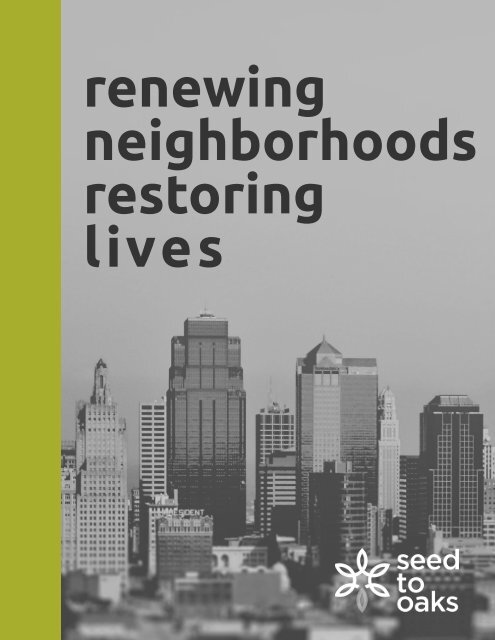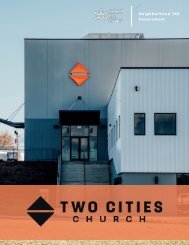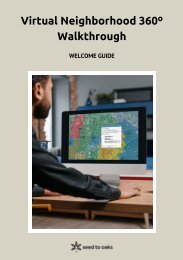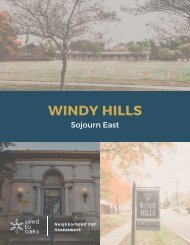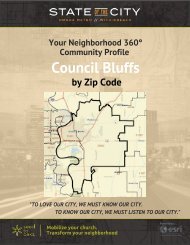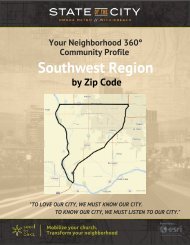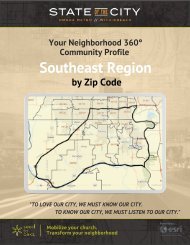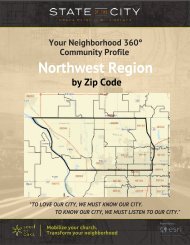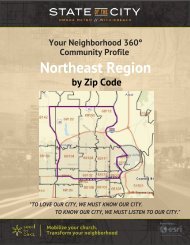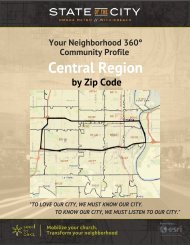Renewing-Neighborhoods
Create successful ePaper yourself
Turn your PDF publications into a flip-book with our unique Google optimized e-Paper software.
enewing<br />
neighborhoods<br />
restoring<br />
lives
RENEWING NEIGHBORHOODS,<br />
RESTORING LIVES<br />
Like a doctor with healing medicine, God steps into need,<br />
brokenness, and injustice with a promise to restore all<br />
things and make all things new. The gospel rights wrongs,<br />
restores peace, and reverses the effects of sin, allowing<br />
humanity to once again flourish under God’s rule. Like<br />
the Great Physician, we are invited to apply the healing<br />
medicine of God’s Spirit as we love our neighbor, do<br />
justice, and serve others by providing for their most basic<br />
and simple needs.<br />
This promise of restoration does not mean we are immune<br />
to suffering. We all hurt. Spiritual warfare is real. God never<br />
promised us a life without need or hardship, but he has<br />
promised us something greater – his presence and power.<br />
God’s presence and power enable us to step into other’s<br />
needs, not only with words but also with action, as we<br />
live openly, equitably, and generously together (Jeremiah<br />
30:27, Micah 6:8, Galatians 6:10, 1 Peter 5:10, Revelation<br />
21:1-5).<br />
used with emotional appeals for money.<br />
The Bible teaches that poverty is ultimately spiritual,<br />
stemming from a broken relationship with God, ourselves,<br />
others and creation. This separation, resulting from our<br />
sin, is universal in scope, making everyone “poor” in the<br />
deepest sense.<br />
And yet, we must not over-spiritualize poverty. The<br />
Bible also describes poverty as the lack of resources and<br />
relationships to meet basic human needs such as food,<br />
clothing, and housing. Injustice, selfishness, greed, and<br />
oppression are just a few of the devastating results of sin.<br />
Causes of Poverty<br />
The causes of poverty are complex and it’s easy to be<br />
reductionist in our thinking. Many people, for example,<br />
might suggest personal sin (such as laziness or addiction)<br />
or even natural disasters (such as a tornado or flood) as<br />
chief among the causes of poverty. It’s true that these are<br />
indeed biblical causes. Failure to work, foolish choices, and<br />
acts of God can all lead to poverty. Yet, lesser known to us,<br />
Scripture points to the reality of injustice.<br />
The Poor Among Us<br />
The numbers of world poverty are staggering. 1.22 billion<br />
people in the world live on less than $1.25 a day. 1 Part<br />
of the challenge is that many of us never see the poor;<br />
we do not see their faces or hear their stories. They are<br />
invisible to us, or we picture them as living so far away<br />
that they have nothing to do with us. So it’s not surprising<br />
that when we do interact and relate with the poor, we lack<br />
discernment. We simply don’t know what to do.<br />
What is Poverty?<br />
The Bible challenges our assumptions about the nature<br />
and causes of poverty. We think we understand poverty<br />
because we see images on TV or hear stories from<br />
missionaries or non-profits. “Poverty,” “justice,” and “the<br />
poor” can also be confusing terms because they are often<br />
The Bible challenges us to see that the societies we build<br />
and the social systems we develop are broken in such<br />
a way that they can lead to oppression and exclusion,<br />
leaving entire neighborhoods and nations powerless to<br />
change their desperate circumstances. This is difficult to<br />
accept because many of us do not see or do not want to<br />
believe that the very systems that benefit us are often the<br />
same ones contributing to the poverty of others.<br />
Doing Justice Out of Merciful Love<br />
God says in Deuteronomy 15:4 that “there need be no poor<br />
people among you.” This doesn’t mean that we exclude<br />
the poor from our church family or ignore the needs of<br />
those around us. Quite the contrary, God is inviting us to<br />
do justice – to care for the vulnerable – out of merciful<br />
love. 2<br />
1. The World Bank, 2013.<br />
2. Adapted from Tim Keller, Generous Justice, 3.<br />
1
WHAT IS MERCY? 3<br />
1. Mercy is an attribute of God. God’s mercy is His kindness<br />
toward those in misery and distress (Jer. 3:12). Mercy<br />
is what moves God to alleviate and remove suffering.<br />
2. Mercy is at the heart of the gospel. Each Christian is<br />
by definition someone who has needed mercy and<br />
forgiveness, and has received it (Titus 3:3-5).<br />
3. Mercy is action with attitude. You can’t just feel mercy<br />
without showing it, or else it does no one any good. At<br />
the same time, just doing acts of mercy without love<br />
profits you nothing.<br />
4. Mercy is proof of love. Love is the mark of the church,<br />
and mercy ought to be our consistent response to<br />
need.<br />
5. Mercy is for every believer. Mercy in Scripture is never<br />
spoken of as an option or an add-on to the life of a<br />
Christian, but rather as an invitation and expectation<br />
for every believer.<br />
God among the poor and vulnerable (Matthew 5:3, Luke<br />
1:50, Galatians 2:10, 2 Corinthians 8:9).<br />
Receive<br />
Through Jesus Christ, God has opened to us the door of<br />
heaven. When we remember the love that God has shown<br />
us, we long to show that same love to others. God freely<br />
receives us in Christ, so freely we receive and embrace<br />
those around us. We invite the needy and vulnerable into<br />
our homes, lives, and relationships (Matthew 10:8, 22:9,<br />
25:34-36).<br />
Listening<br />
Receiving the poor and vulnerable begins with listening.<br />
It’s too easy to just walk on by or quickly give what the<br />
person wants. If we are to love well, then we must learn<br />
to listen well.<br />
God calls every Christian to hold firmly to the Word of<br />
life and shine like stars in our dark world. Many grumble<br />
and complain about the poor and the crime and problems<br />
that poverty brings into their neighborhood. As believers,<br />
we get a chance to put off grumblings and step into<br />
mercy (Philippians 2:14-16). Restoration happens when<br />
we sacrificially serve our neighbors in word and deed,<br />
using our gifts and resources to meet the needs of others,<br />
especially the poor. When faced with need in the world,<br />
God calls us to Remember, Receive, Relate, Respond and<br />
Renew.<br />
Remember<br />
Restoration begins with remembering. We are all spiritually<br />
poor and bankrupt before a holy God. The good news is<br />
that Jesus meets our deepest need and restores us to God.<br />
When we begin to understand this, our attitudes toward<br />
the materially poor shift from one of condescension (or<br />
paternalism) to a humble affection, humility, and empathy.<br />
God the Father commands us, Christ’s love compels us, and<br />
the Holy Spirit empowers us to go and show the love of<br />
Listening is a form of love. 4 By listening, we put aside<br />
our agenda, we take a break from what we are doing,<br />
and we give our attention to the other. Listening requires<br />
selflessness and humility. It is a form of love, and love is<br />
good for relationships.<br />
Relate<br />
Not only does God receive us into a relationship with<br />
Himself, he personally relates to us with kindness,<br />
compassion, and care. This means we treat everyone, even<br />
our enemies, with kindness, fairness, dignity, and respect<br />
(Proverbs 14:31, Luke 6:32-36, 14:12-13, 1 Peter 2:17).<br />
Some practical ways we relate with others is respecting<br />
one another, eating and drinking together, and caring for<br />
one another.<br />
Respect – We are God’s personal handiwork and we are<br />
to respect and honor his image in every person. We show<br />
respect by treating others as we want to be treated. We<br />
3. Adapted from Randy Nabors, Mercy Seminar, 2008.<br />
4. This section adapted from The Art of Listening by Bart Velthuizen.<br />
2
don’t judge others before we get to know them. And we<br />
don’t insult people or make fun of them regardless of their<br />
circumstances. If you respect others, they will respect you.<br />
Eat –Salvation is pictured as a bountiful feast and God<br />
satisfies the deepest hungers of the soul. Take the next step<br />
and share a meal. When we eat or have a drink with people<br />
outside our family and offer friendship and community,<br />
we are demonstrating God’s invitation to salvation. Eat a<br />
meal, grab a cup of coffee, or as time passes, enjoy cooking<br />
something together.<br />
Care – As we enter into a new relationship with the poor<br />
or vulnerable, we actively seek ways to advance their wellbeing.<br />
This happens when we feel empathy toward others,<br />
especially those who have been wronged. This means<br />
emotionally identifying with them: feeling anger with<br />
their anger, humiliation with their humiliation, hurt with<br />
their hurt (Wolterstorff).<br />
believe in Christ, and be saved. The poor are not exempt<br />
from this requirement, as if their poverty somehow<br />
atoned for sins. Central to every response must be the<br />
proclamation of Jesus Christ and his redemptive work for<br />
sinners. 5<br />
Renew<br />
Imagine the world without hunger. Wouldn’t that<br />
world be a better place? When multitudes of Christians<br />
practice rhythms of remembering, receiving, relating, and<br />
responding, corporate renewal in society is possible. We<br />
acknowledge common grace and that non-Christians<br />
share with us common intuitions about the good, the true,<br />
and the just. We appeal to those common values and work<br />
alongside our neighbors in an effort to improve justice in<br />
society and fight against the effects of sin in the world. 6<br />
We seek the peace in our cities by prayer, our powerful<br />
presence, and public action (Psalm 37:6, Job 29:14,<br />
Nehemiah 2:17-18, Jeremiah 29:7).<br />
Respond<br />
God remembers us, receives us and relates to us through<br />
his son Jesus. Jesus saw our need and responded with<br />
radical generosity. He healed the sick, befriended the poor,<br />
and forgave sin. We are called to respond to the poor and<br />
vulnerable among us with the same radical generosity<br />
through material giving, social reform, and spiritual care<br />
(Deuteronomy 15:4, Acts 4:34-35, 1 John 3:17-18, James<br />
2:15-17).<br />
Material Giving: A gift can bring healing. Good news can<br />
bring health. And a blessing is like cold water given to<br />
a weary person. We respond by using our money and<br />
material possessions to bless others.<br />
Social Reform: Respond by advocating, using your<br />
education, job search skills, financial counseling, or social<br />
networks.<br />
Spiritual Care: The weak and the poor, just as much as the<br />
rich and the powerful, need to hear the gospel, repent,<br />
Envision: We envision the world without poor health,<br />
poor education, sex trafficking, slumlords, payday lending,<br />
slavery, joblessness, etc. 7<br />
Embody: We live justly and work for justice according to<br />
our gifts.<br />
Entrust: We equip others for the work and release them<br />
into the world.<br />
WHAT YOUR CHURCH CAN DO<br />
Trying to guess the needs of your neighborhood will<br />
cause you to waste a lot of valuable time. There is a better<br />
way. The best way to know the needs around you is to<br />
personally go and ask individuals in the area. Here are five<br />
questions we recommend asking:<br />
1. How long have you lived in this community?<br />
2. What do you like best about this community?<br />
5. Greenway and Monsma, 1989:174<br />
6. Tim Keller, Center Church.<br />
7. Sometimes a disease can be knocked out; sometimes sex traffic can be considerably reduced; sometimes slavery can be abolished in a region; sometimes more equitable<br />
laws can foster justice and reduce corrup- tion…In these and countless other ways cultural change is possible. More importantly, doing good to the city, doing good to<br />
all people (even if we have a special responsibility for the household of faith), is part of our responsibility as God’s redeemed people… - Don Carson<br />
3
(Identifies areas where God is already at work.)<br />
3. What changes would you like to see that could make<br />
life better in this community? (Indicates their greatest<br />
felt needs.)<br />
4. Do you have any ideas about ways a caring church<br />
could make a difference? (Helps you discern how you<br />
and your church can meet those needs.)<br />
5. Can you share a story when people or organizations<br />
helped one another out or had a positive impact on<br />
the neighborhood? (Indicates acceptable pathways<br />
for service.)<br />
CONCLUSION<br />
When any church–whether new or old, large or small–<br />
decides to do justice, love mercy and walk humbly, the<br />
Lord’s blessing is near. The size of your response is not<br />
what matters most. To be shining stars of restoration, our<br />
deeds and words need only point to our Savior Jesus, who<br />
upon his return will restore all things. A cup of cold water<br />
on a hot day to a thirsty homeless man can be just as<br />
powerful evidence of Christ’s mercy as restoring multiple<br />
homes in an old forgotten neighborhood. With all of the<br />
increasing demands of life and ministry, all we ask at<br />
Sojourn Network is that you continue to remember the<br />
poor, do not forget to do good, and to share with others,<br />
for with such sacrifices God is pleased (Galatians 2:10;<br />
Hebrews 13:16).<br />
4
APPENDIX A<br />
Resources for further study:<br />
Ministries of Mercy & Generous Justice by Tim Keller. This<br />
is the most helpful theology of mercy that I have come<br />
across. I use these books in my six-week introduction to<br />
mercy class.<br />
When Helping Hurts by Steve Corbett and Brian Fikkert.<br />
The book includes a simple overview of poverty and<br />
distinguishes between charity and development.<br />
Walking with the Poor by Bryant Meyers. This is a good<br />
introduction to the nature of poverty and different ways<br />
of viewing and addressing poverty.<br />
Churches that Make a Difference by Sider, Olson and Unruh.<br />
Here is a great resource for community ministry. Topics<br />
include social outreach, evangelism, community surveys<br />
and demographic study.<br />
Beyond Charity and Restoring At-Risk Communities by John<br />
Perkins. Perkins is a pioneer in community development<br />
and is required reading in the field of study.<br />
To Live in Peace by Mark Gornik. This book presents a<br />
theological argument for community development and<br />
highlights New Song Community Church in Baltimore,<br />
Maryland.<br />
APPENDIX B<br />
Doing Justice Out of Merciful Love<br />
1. What was it like experiencing God’s mercy when you<br />
first believed?<br />
2. In what ways have your own sufferings kept you from<br />
stepping into the needs of others?<br />
3. Share a time when you have experienced injustice,<br />
poverty, or when your needs were not met.<br />
4. What picture comes to mind when you think about<br />
Jesus’ promise “I am making everything new!”<br />
Remember<br />
1. What are the results of remembering that we are all<br />
poor in spirit?<br />
2. What genuine fellowship is possible given that Jesus<br />
meets the deepest need of anyone and everyone who<br />
trusts him?<br />
3. Why is it so hard to take seriously God’s command to<br />
love the poor?<br />
4. Reflecting on the above Scriptures, what does God feel<br />
toward the poor and vulnerable? How does this differ<br />
from how you feel toward the poor and vulnerable?<br />
Receive<br />
1. How much effect does someone’s physical appearance<br />
have on your first impressions of him or her? How<br />
often do your first impressions change once you get<br />
to know a person?<br />
2. Share a time when you were able to bless someone<br />
and they were not able to pay you back. How were you<br />
blessed?<br />
3. Sometimes we need to be intentional about locating<br />
the poor before we can receive them. Where in your<br />
neighborhood or city do the poor live? How can you –<br />
as a group – go, invite and receive them?<br />
4. What are the risks and rewards of doing what Jesus<br />
says here about receiving the poor?<br />
Relate<br />
1. How do you think racial and class divisions affect your<br />
life today?<br />
2. What are some of your personal barriers to effective<br />
listening?<br />
3. What do you sense the Holy Spirit is saying to us<br />
about how we relate to those economically, racially or<br />
socially different than us?<br />
4. What can we do to become a significantly more caring<br />
community group among the poor and vulnerable?<br />
Respond<br />
1. God gives each of us many gifts that we take for<br />
granted. What gifts has God given you that you often<br />
hide or fail to use for his glory?<br />
2. What objections might a person raise to God’s<br />
command that there be no poor among you?<br />
3. Jesus was mighty in Word and deed. We typically prefer<br />
one to the other, yet Scripture calls us to a balanced<br />
approach. Are you Word or deed driven and why?<br />
4. How can we, as a group, obey God’s call to radical<br />
5
generosity and cultivate the habit of responding to<br />
need?<br />
Renew<br />
1. Have you ever taken the time to dream about what<br />
your community could be?<br />
2. What do your neighbors dislike about your<br />
neighborhood? How can you help bring about<br />
change?<br />
3. If you inherited ten thousand dollars, what social<br />
injustice would you use it to address? Why?<br />
4. How are we as a group living justly and working for<br />
justice in the world? What areas do we want to grow<br />
in?<br />
6


